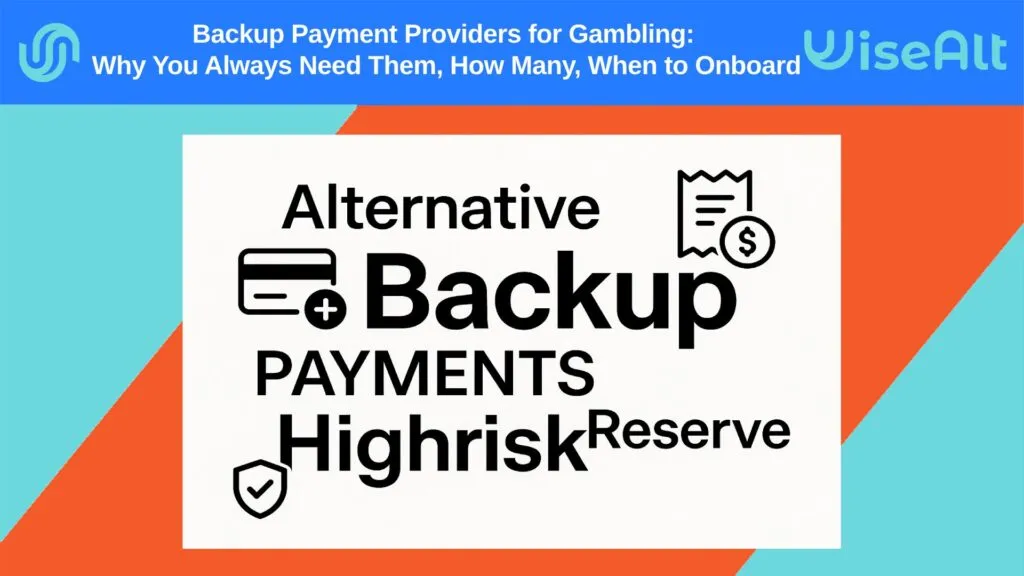In the high-risk world of iGaming, betting, dating services, crypto exchanges, and other similar industries, having backup payment providers is not a luxury – it’s a necessity. This article explores why multiple payment channels matter, how many providers you should have, and how to onboard them strategically without overwhelming your resources.
Why One Payment Provider is Never Enough
No matter how reliable your primary provider seems, every gambling or betting operation should be prepared for sudden disruptions: frozen accounts, compliance issues, or even unexplained service suspension. This is particularly common in high-risk categories like:
- Online Casinos and Sports Betting
- Forex and Binary Options
- Crypto Exchanges and Wallets
- Adult Entertainment, Dating, and Webcam Services
- Online Dating Platforms
- Nutraceuticals and Supplements
- Travel and Ticketing Platforms
- High-risk eCommerce
If you’re operating globally, the stakes are even higher. Access to online iGaming payment solutions in the USA, EU, UK, Canada, India, SEA (Southeast Asia), and LatAm is essential for market penetration and user trust. For reference, see Statista’s gambling revenue by region and Grand View Research’s global forecast.
What are Backup Payment Providers?
Backup, alternative or reserve payment providers are PSPs (Payment Service Providers) you integrate in advance and activate only when necessary. These are not alternative payment methods like crypto or local APMs; they are full-service acquiring solutions ready to process cards, ewallets for iGaming, and other mainstream rails, just like your main provider.
They are a key part of business continuity planning (BCP) for high-risk sectors.
Benefits of Backup Payment Providers
- Avoid service outages and maintain uptime
- Test new markets or flows without risking main traffic
- Balance load across acquirers to maintain good MID health
- Negotiate better terms by avoiding overdependence
- Prevent bottlenecks when main PSPs are underperforming
How Many Backup Payment Providers Do You Need?
While there is no one-size-fits-all answer, we recommend the following based on our industry experience:
- Monthly TPV (Total Processing Volume):
- Under $100K: 1 main + 1 backup
- $100K–$500K: 3 total, e.g. 70/20/10 distribution
- $500K+ and scaling: 3–5 active channels + smart routing
- Traffic Quality:
- Organic traffic comes from search engines or direct brand queries. It tends to convert well and complies better with KYC/AML requirements.
- Arbitrage traffic is acquired via ad networks, often with aggressive creatives. It brings scale but can result in more declines or fraud.
- High-chargeback traffic includes campaigns or GEOs that consistently generate disputes. These should be routed to tolerant PSPs or isolated MIDs.
Managing high-risk traffic types requires:
- Custom rules and filters at gateway level
- Segmentation by campaign or GEO
- Dedicated MIDs for volatile traffic sources
Where to Start: Phased Onboarding
Step 1: Sign Agreements Before You Need Them
Many gambling operators make the mistake of negotiating only when a crisis hits. Good providers are selective and often slow to onboard. Pre-negotiated dormant contracts are a strategic asset.
Step 2: Start Small with a Real-World Test
Push a limited volume ($5K–$10K) via the backup provider. Focus on:
- Conversion rates
- Decline codes
- Settlement timelines
- Support responsiveness
Step 3: Compare Conversions and Build Reports
Check geo-specific conversion variance. Some PSPs underperform in LATAM, others in India. eWallets for iGaming might offer a simpler flow than acquiring, especially in Asia.
Step 4: Expand Volume Based on Performance
But better never route more than 50–60% through any one provider.
Technical Approaches to Handling Multiple Providers
Manual Routing
For small teams, manually switching payment URLs can be a quick fix. You just need to have several separate checkout pages for each provider, which can be manually adjusted in your code when you want to switch providers.
JavaScript Payment Logic
We can help to deploy JS script that dynamically switch PSPs based on GEO, currency, or fallback logic.
Gateway with Smart Routing
If you control your own gateway or use a third-party one, implement rules such as:
- GEO-based routing
- BIN-based card logic
- Random A/B testing between MIDs
Reliable third-party gateways with smart routing features typically start from around USD 2,000 setup fee plus per-transaction costs.
Challenges and How to Minimize Them
Time & Resources
Onboarding processes – including agreement signing and compliance checks – usually take a minimum of 3 weeks depending on case complexity and the responsiveness of the PSP’s risk/compliance team. Integrations can take 2–4 weeks, especially with custom PSPs. Plan accordingly.
Cost of Maintenance
Each additional provider means more contracts, compliance reviews, and reporting. Keep it lean until tested.
Team Complexity
Non-technical teams may struggle with multi-PSP architecture. A good gateway or routing logic simplifies this.
Why Big Operators Always Use Multiple Channels and backup payment providers
Top iGaming operators never put 100% of volume in a single PSP. They segment traffic, test flows, and maintain dormant PSPs for emergencies.
This avoids:
- Revenue drops during provider issues
- Sudden risk profile deterioration
- Losing access to mission-critical geos
- Operational bottlenecks when scaling aggressively
Final Thoughts
Backup payment providers for gambling are not optional for high-risk industries. They are a strategic safety net and a gateway to growth. Whether you’re just starting or processing millions monthly, we recommend planning your PSP structure like your core infrastructure.
Work with WiseAlt
At WiseAlt, we:
- Help you accelerate onboarding with reputable high-risk PSPs
- Increase your approval success rate through optimized compliance documentation
- Secure better commercial terms through our partner network
- Assist in integrating payment flows, including JS routing scripts or third-party gateway logic
Let’s talk about how we can future-proof your betting payment solutions or optimize your igaming online payment stack with more reliable flows like ewallets for iGaming.
FAQ
What are the best regions to start with new PSPs for iGaming?
SEA and LatAm for volume, EU and UK for stability, and India for expansion.
Can I use ewallets for iGaming without a dedicated MID?
Yes, especially in Asia. They offer lower friction and are easier to activate.
What is the best volume distribution between providers?
Never send more than 60% through one PSP. Split the rest based on CR and risk.
How long does onboarding usually take?
Between 3 to 4 weeks. Plan in advance and provide clean KYC packages.
What is Organic, Arbitrage, or High-Chargeback Traffic?
- Organic traffic comes from SEO, social presence, or direct visits and is usually high quality.
- Arbitrage traffic is media-buy based, fast but risky, often used for scale.
- High-chargeback traffic needs careful handling—best directed to tolerant PSPs or sandboxed with daily limits.


